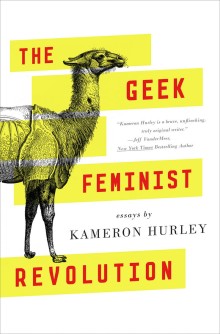 Multiple award-winning (including the prestigious Hugo Award) fantasy author Kameron Hurley assembles a collection of her often brilliantly foul-mouthed, bitterly pragmatic essays in her Geek Feminist Revolution. Hurley’s wide presence on the Internet—where she’s held a blog for more than a decade—and her savviness as a hyper-aware writer give her an authority that is transparent in her wide-ranging selection of essays. From essays on Gamergate and True Detective, to personal narratives about her struggle as a lifelong fiction writer, this is a collection that you can glance at quickly while in line at Starbucks—or sit down with and devour in a couple of hours.
Multiple award-winning (including the prestigious Hugo Award) fantasy author Kameron Hurley assembles a collection of her often brilliantly foul-mouthed, bitterly pragmatic essays in her Geek Feminist Revolution. Hurley’s wide presence on the Internet—where she’s held a blog for more than a decade—and her savviness as a hyper-aware writer give her an authority that is transparent in her wide-ranging selection of essays. From essays on Gamergate and True Detective, to personal narratives about her struggle as a lifelong fiction writer, this is a collection that you can glance at quickly while in line at Starbucks—or sit down with and devour in a couple of hours.
While it may seem from the book’s title that Hurley is addressing a particular niche of Anita Sarkeesian subscribers and iO9 readers, the strength of the collection actually comes from those essays in which she advises aspiring writers. In Part I “Level Up,” she dismantles the illusion that there are not-yet writers on one side, and successful authors on the other, the before and after dynamic of being published that permeates so many discussions on the topic. Writing is a business, and a continual one at that. In one essay, she argues that writing is a game won only with persistence, and then more persistence—and it doesn’t stop, even when you’ve published five novels. In another essay from this same section, she vehemently argues for the responsibility that writers have toward their own stories and the impact of those stories.
The dynamic of Hurley’s message—both to aspiring writers and to the ones who’re already there—frames many of the other essays in the collection. In a particularly brilliant essay, “When the Rebel Becomes Queen: Changing Broken Systems from the Inside,” Hurley talks about her transition from fan to writer, from critic to a position of power, and the power to instigate change. In her brutally honest voice, she writes, “Over the last eighteen months, I have gone from Nobody to Somebody, and after over a decade of being on the side of the nameless internet mob I’ve found that readers have put me on the other side of the fence. I’m not the one howling for justice anymore. I’m the one who’s fucking up and needs to be called out” (195). And that realization comes at the hard price of acknowledging her privilege—the oh so-dreaded word—and to come out of the writerly shell to challenge genres and fandoms that do not go easy on loud-mouthed, fat queer women writers. Throughout the essays, Hurley lays out her own shortcomings, her blind spots, with a refreshing honesty that announces loud and clear her message: it’s ok to acknowledge your privileges. It sucks, but it’s ok. You survive it, and you become the better for it.
While Hurley’s mainstream feminism will certainly not astound more knowledgeable readers, it will resonate strongly with young women who are starting to put words onto their experiences—young women who live in a world full of Gamergater mansplainers and sci-fi novel covers illustrating white women in bikini chainmail. Because she lays out frankly her own experiences with chronic illness, abusive boyfriends, and the hopelessness that comes from too many rejection slips, Hurley’s essays are extremely relatable. In “Public Speaking While Fat,” for example, she highlights the absurdity of managing a three-hour daily workout when trying to write in addition to a day job. In her keen, cynical yet pragmatic way, she refuses to put author pictures on her books (both to protect her gender-neutral name, an asset in fantasy, and to protect herself) and yet she tells her reader: “Go forth into the world, retreat when it is too much but know that when you stand up to be heard, and be counted, you’re doing your own part to change the narrative, and in doing so, to change the world. I promise I’ll be standing there next to you” (162).
In the post-Sad Puppies universe of geek culture, in a world in which Rey is never included in The Force Awakens figurine sets, in the age of dead lesbian TV characters, Hurley’s Geek Feminist Revolution is a beacon of light that will attract a new generation of writers and fans.
The essay collection The Geek Feminist Revolution (272 pages) by Kameron Hurley is available from Tor (May, 2016).
Amandine Faucheux is a second-year PhD student in English and Women’s and Gender Studies at Louisiana State University, where she studies science fiction, queer feminism, and race theory.